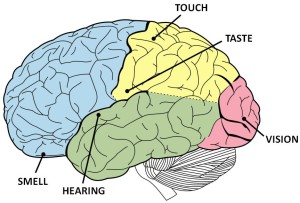 Listening to music is a very sensual thing. When you listen to a good song our bodies can get invested in it, whether it be dancing, or even getting so emotional you cry. Most people can only say they hear sounds though, but there are a few people in this world that can actual see sounds. There is a condition called synesthesia and it connects multiple senses together. For example there is a woman in England who sees different colors when she hears different notes.
Listening to music is a very sensual thing. When you listen to a good song our bodies can get invested in it, whether it be dancing, or even getting so emotional you cry. Most people can only say they hear sounds though, but there are a few people in this world that can actual see sounds. There is a condition called synesthesia and it connects multiple senses together. For example there is a woman in England who sees different colors when she hears different notes.
Another example is a man named Matthew Blakeslee who can taste different things when he touches different things, such as raw meat. Synesthesia has been studied by scientists since the 1880’s, but it was for a long time thought of as mockery. Then it was perceived as if the person affected was on LSD, it wasn’t until the 90s until it was studied for real. The mechanism for why people are like this is a difference in the temporal and parietal lobes of the brain.
Another type of synesthesia is people who associate colors and shapes to numbers. My best friend actually has this type of synesthesia, and it has actually has helped her in her schooling. “It makes it easier to make mental associations.” says my friend, Sarah. This makes sense on why she was in the top 5 in my class, and she didn’t even try.
A test that was done to see if somebody actually has this type of synesthesia, a team of scientists put certain numbers into certain shapes, like a triangle. The numbers were also varied in color, and only people with the condition automatically assumed certain colors were certain numbers when putting them into shapes.

When someone can hear colors on the other hand it means that auditory and visual signals are mixed. What happens is that the brighter the sound, the brighter the color, so it is a correlation. Also, when the sound is louder the color is more prominent, also correlating with dynamics.
There is no possible way of synesthesia being anything other than a biological occurrence. I mean there is a possibility that people are lying, but the results of the number test showed that all of the people diagnosed reacted like they should have, and those without did the same. It is hard to experiment on something that is a condition, and that is why there were not too many experiments done on these people. The condition is also not exactly common, especially the severe cases such as seeing sounds.
It would be really cool to be able to sense everything at once, but at the same time it could be very annoying to see yellow every time you heard someones nasaliy voice. So if you can see sounds, or associate colors with numbers, you may have synesthesia!


I wonder how many people in the world have synesthesia as I have never met anyone with it, but would be amazed to hear somebody tell me what it is like. Are people that have synesthesia the same? In other words, do they associate the same words and/or numbers with the same colors and vice-versa or is it completely different for everybody? It’s got to be annoying at times, but no doubt I am sure it is quite unique to experience.
As soon as I saw this title I got hooked. This was a very interesting blog. Never before have I heard of synesthesia. It is almost so amazing I would think its not real. I think a really good thing to observe would be what classes synesthesia exactly helps with. As you said in the beginning, your friend Sarah is in the op 5% of her class and doesn’t even try. I assume that synesthesia has a big effect in math since you can associate math and colors together but what about Spanish or History? Can synesthesia help for classes such as that and how exactly. I also wonder how many colors people with synesthesia are able to see. I think science needs to explore deeper into this subject because I think it can make a really big impact in our world.
I think that one of my friends has this. Apparently he can see colors when he plays certain notes on a guitar, and he taught himself to how to play on his own. I’m very curious to know why people are born with synesthesia. This website says that one theory is that it is caused by a breakdown of the wall or boundaries between senses. Another theory believes that all babies have this, but grow lose the ability as they grow up. It would be interesting if researchers could gather data about all of the people in the world with synesthesia and studied their backgrounds to see if there is something they did that could be an explanation.